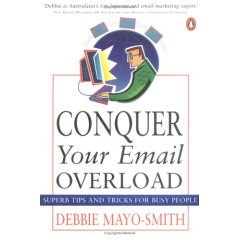
The Clutter-Busting Handbook:
Clean It Up, Clear It Out, and Keep Your Life Clutter-Free
Get it here
|
|
Getting Things
Done, the importance of getting your inbox to zero, and
strategies for dealing with high volume email
If
you sit at a computer for most of the day, it's tempting to
constantly check your e-mail to see
what's new. But that's a
time management disaster if you're trying to make progress in
your business.
Resist the temptation. Here are some tips to help you get that
time-eating monster under control.
The Secrets To E-Mail
Nirvana
You crank up your computer every morning,
click to your e-mail and--whap!--a slew of messages demands attention.
E-mail can be a great tool, but many
misuse it, turning what should be quick, easy communication into a
laborious, time-consuming management chore.
"Many people use the inbox as a to-do
list, calendar and filing system," says Mark Hurst president and founder
of Creative Good, a consulting firm in New York. "File some messages and
delete most of them, but without a doubt, don't let anything stay in
your inbox permanently."
Hurst says effective e-mail management is
built on filters, filing and ruthless use of the delete key.
Manage your e-mail so that is does
not rule your workday
9 Tips To Help You Write More
Powerful Emails
1. Make the effort to learn about the etiquette (these days
known as "netiquette") involved in writing emails. There are loads of good
reference websites and books about the internet which will tell you the basics.
I know it might seem a bit precious to attach so much importance to social
niceties when the internet is basically very informal. However, whether we like
it or not many people do take online etiquette very seriously. So if you're
writing emails for business, you should assume that your recipient may well be
one of those...
More on Writing
Personal Internet surfing at work
costs Companies over $300 billion a year
According to a new survey by
America Online and Salary.com, summarized by Dan Malachowski,
the average worker admits to wasting 2.09 hours per 8-hour
workday, not including lunch and scheduled break-time. The
survey indicates that employees are wasting about twice as much
time as their employers expect. Salary.com calculated that
employers spend $759 billion per year on salaries for which real
work was expected, but not actually performed.
The biggest distraction is
personal Internet use by 44.7% of the more than 10,000 people
polled. Socializing with co-workers came in second at 23.4%.
Conducting personal business, "spacing out," running errands,
and making personal phone calls were the other popular
time-wasting activities in the workplace.
More on workplace success
|
 Conquer
Your Email Overload: Superb Tips and Tricks for Busy People
(Paperback) Conquer
Your Email Overload: Superb Tips and Tricks for Busy People
(Paperback)
by Debbie Mayo-Smith
Everyone is wrestling with their
bulging email inboxes at home and at work. We all know that email should be
making life easier for us but is it? Conquer Your Email Overload will
give you the tools to take control of your email and to make it work for you, in
business and in your personal life. Following a simple question and answer
- problem and solution approach, the book takes the reader through all the most
common email frustrations, from losing an email, to dealing with email overload,
so that you can make email work for you in your business and leisure activities.
Just because we
can send an
email doesn't
mean we should!
The planning
team of a large
institution
often work on
large
collaborative
projects. This
often requires
input from all
members. They
had been in the
habit of sending
emails to all
members of the
team for input
and
contributions.
In a training
session someone
said: ĎI feel I
let the team
down when I'm
slow to
contribute to
these group
email
discussions.'
More
on Organisation
Management
How
Not to Stick Your Foot in Your Mouth via E-Mail
E-mail is the most common form of business
communication today; itís among the most common forms of all communication. Yet
many people communicate poorly with e-mail.
Thatís the opinion of Janis Fisher Chan, and I
agree. Chan is the co-founder of Write It Well (http://www.writeitwell.com),
a publishing and training firm operating out of Oakland, Calif., that, since
1980, specializes in helping businesspeople write clearly and concisely in
e-mail and elsewhere. She also authored the newly published book E-Mail: A
Write It Well Guide, as well as eight other books on business writing and
additional topics.
I talked with Chan about why we write poorly in
e-mail, what consequences this can have, and how we can improve.
More on Communication
How to check an e-mail's source
without opening it
Have you found that the spam pests
are becoming ever more tricky and you're getting more and more
seemingly innocuous mail from people you've never heard of?
If in doubt, don't open. Instead,
as it sits unopened in the Inbox, just highlight it and then
right click. Choose 'Options', read down a few lines in the
Message Options dialogue box - essentially the html and code
behind the mail - and you can usually see who it's for. If it's
spam the intended recipient (supposedly you) will almost always
be a bogus name.
An old college friend and
accomplished writer, John Scalzi, recently posted a
list of
writing tips for non-professionals, which I'd highly recommend
for professionals and non-professionals alike. One of his most
unusual suggestions is to "speak what you write" -- literally,
to read your writing out loud before publishing, whether in a
blog post or just an e-mail to friends. This, he argues, will
not only help catch spelling and other errors (each of which
Scalzi says decreases the writer's apparent IQ by 5 to 10
points), but also help you see whether you're conveying the
meaning you intend.
So what does psychology research
have to say about this notion? (No, not that typos decrease your
IQ, but the larger idea that reading your words out loud will
help you determine if your meaning is clear.
|


